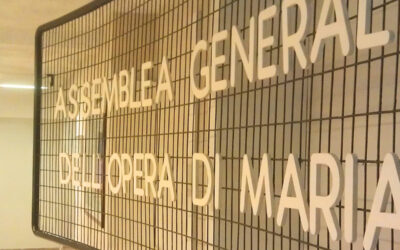 “I’ve never been so close to the site of a terrorist attack. Nowadays we are somewhat accustomed to seeing such catastrophes everyday on the news but passing in front of the metro station only a few minutes before and thinking that it was so close by and not knowing exactly what to do is quite another thing. I’m a firm believer that a united world is possible. Through my commitment in New Humanity, but mostly through the small daily actions, I try to live and act in a spirit of fraternity that is also expressed in the Universal Declaration of Human Rights. But, as the news came and the howling of sirens intensified outside my window, I was blown away. Okay, it was all so close by, but still what could I do? Stay put and respond to all the messages from friends and relatives who were asking for news? Should I take to the streets and go to help who knows who and how? Should I keep working as if nothing had occurred? It was surreal, and I found myself disoriented and helpless. It also made me question the meaning of it all. What could have moved them to push some young people like me to hate to the point of being ready to sacrifice their lives in order to kill so many defenseless passengers, chosen at random and pressed into a packed metro car? I wondered what crime I would had committed that I should have to die with them. I could not find any satisfactory answers in any of the theories I had learned at university in political science class. What did give me some light was the memory of the previous evening spent with several youth who are engaged in living the same commitment as me, and during that evening we had promised another time to be instruments of brotherhood and dialogue for the people around us. Trying to put aside my confusion, I realized that, in those moments, it was (almost) as if I was experiencing the war in my own skin, all the more reason to be a peacemaker beginning with the people who were with me at the moment. Colleagues, friends and acquaintances… in spite of the terror and shock, I slowly began to realize that I was not the only one to think so. Everybody – each in their own way we’re dealing with their emotions – none of them found words of hate for what had happened, but everyone was convinced that dialogue was the only way possible to respond to such insane acts. The words spoken by Chiara Lubich, founder of New Humanity and the Focolare Movement, when she was awarded the UNESCO Peace Education Prize in December 1996, seemed truer to me than ever. “Anybody who would like to clear today’s mountains of hatred and violence finds themselves in front of an immense and weighty task. But what is impossible to millions of isolated and divided individuals, seems possible once they make mutual love, mutual understanding and unity the essential activity of their life.”
“I’ve never been so close to the site of a terrorist attack. Nowadays we are somewhat accustomed to seeing such catastrophes everyday on the news but passing in front of the metro station only a few minutes before and thinking that it was so close by and not knowing exactly what to do is quite another thing. I’m a firm believer that a united world is possible. Through my commitment in New Humanity, but mostly through the small daily actions, I try to live and act in a spirit of fraternity that is also expressed in the Universal Declaration of Human Rights. But, as the news came and the howling of sirens intensified outside my window, I was blown away. Okay, it was all so close by, but still what could I do? Stay put and respond to all the messages from friends and relatives who were asking for news? Should I take to the streets and go to help who knows who and how? Should I keep working as if nothing had occurred? It was surreal, and I found myself disoriented and helpless. It also made me question the meaning of it all. What could have moved them to push some young people like me to hate to the point of being ready to sacrifice their lives in order to kill so many defenseless passengers, chosen at random and pressed into a packed metro car? I wondered what crime I would had committed that I should have to die with them. I could not find any satisfactory answers in any of the theories I had learned at university in political science class. What did give me some light was the memory of the previous evening spent with several youth who are engaged in living the same commitment as me, and during that evening we had promised another time to be instruments of brotherhood and dialogue for the people around us. Trying to put aside my confusion, I realized that, in those moments, it was (almost) as if I was experiencing the war in my own skin, all the more reason to be a peacemaker beginning with the people who were with me at the moment. Colleagues, friends and acquaintances… in spite of the terror and shock, I slowly began to realize that I was not the only one to think so. Everybody – each in their own way we’re dealing with their emotions – none of them found words of hate for what had happened, but everyone was convinced that dialogue was the only way possible to respond to such insane acts. The words spoken by Chiara Lubich, founder of New Humanity and the Focolare Movement, when she was awarded the UNESCO Peace Education Prize in December 1996, seemed truer to me than ever. “Anybody who would like to clear today’s mountains of hatred and violence finds themselves in front of an immense and weighty task. But what is impossible to millions of isolated and divided individuals, seems possible once they make mutual love, mutual understanding and unity the essential activity of their life.”
Meeting You is a celebration!
Meeting You is a celebration!




0 Comments